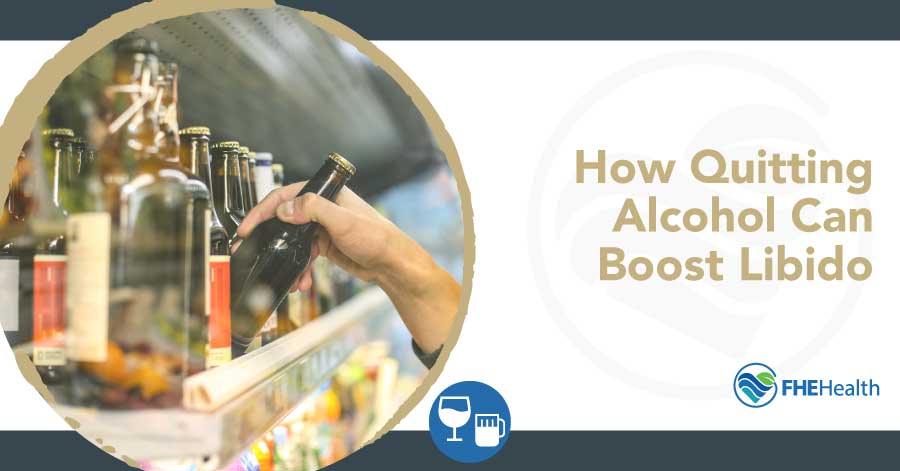
Eddie loves to party. He and his friends go out every weekend and drink away the time from Friday night to Monday morning. Most of his guy friends are single, so they don’t mind spending their weekends this way. But Eddie met a girl recently — Leah — who’s shown interest in him. They’ve gone on a few dates, and things seem to be getting serious.
Eddie loves the time he gets to spend with Leah. She’s funny and doesn’t fuss when he wants to spend time with his boys. But he’s noticed a problem recently. He’s attracted to Leah, but he hasn’t been noticing any outward signs of that attraction when he’s around her. He’s worried his ability to perform in the bedroom might be a problem.
What Eddie doesn’t realize is that there’s a chance his alcohol use has had a negative impact on his libido. While he isn’t alone in this issue, it’s frightening for him to think that this may be impacting his relationship and is concerned about long term effects. He knows he needs to do something, so he decides to look into the matter.
How Big of an Issue is Alcohol Usage?
Consuming alcohol is a normal part of adulthood for many people around the world. They may be able to drink socially without becoming dependent or addicted to the alcohol. Unfortunately, millions of Americans suffer from an alcohol use disorder, and some of them might feel they’ll never be able to overcome it.
Approximately 14.4 million American adults, which includes around 9.2 million men, have an alcohol use disorder. There are many impacts that come with this condition. One that many men may have to deal with is a dip in their sex drive. A lowered libido, or even the loss of libido, is possible with alcohol usage.
Alcohol use can also cause aggression, which might be off-putting to some people. While this isn’t a direct impact on sex drive or libido, it can lead to problems in the bedroom because the other person might become uninterested in moving forward with the activities.
How Does Alcohol Impact the Sexual Organs?
One primary impact of alcohol is that it acts as a blood thinner. Increased blood flow to the penis is what causes an erection, so the blood-thinning property of alcohol can have a negative impact on a man’s ability to achieve and maintain an erection. This can make it hard for the man to have a meaningful physical relationship.
Alcohol also has an impact on the chemical balance in the brain, which can affect sexual drive and libido. Some people think alcohol usage makes them more likely to want to have sexual relations; however, that’s not necessarily the case. Alcohol can lower your inhibitions, which can help men to approach people of the opposite sex, but that doesn’t necessarily mean their sex drive is going to be there.
Consuming a drink or two may help relieve anxiety and stress, both of which can have a negative effect on sex drive. This may help you start a conversation with someone new or move things forward in the bedroom, but the way it affects an erection can make it difficult to perform once things start to get serious.
Alcohol use can also affect a man’s sperm. It can reduce the production of sperm and alter the size, shape, count and motility, which can make it hard for the man to father a child. Heavy drinking can also have a negative impact on ejaculation.
Men who are heavy drinkers can suffer from early ejaculation. Sometimes, they have decreased ejaculation that leaves them with an unsatisfied or unfinished feeling. These can lead to mental blocks dealing with sexual activity because the man may feel the problems make it pointless to try to have a sexual relationship.
What Are the Challenges of Quitting Alcohol to Improve Libido?
Some people who rely on alcohol to make it through the day have underlying problems they need to address. This might be trauma from past abuse, depression, post-traumatic stress disorder or a host of other mental health challenges. While it might be easy to focus on trying to put down the alcohol, it may be virtually impossible to do so until the mental health matters are taken care of.
Social life can be another issue in these cases. A person who drinks often will usually have a social circle that also turns to alcohol often. This is a problem for a person who’s trying to stop consuming alcohol because there are many temptations when they’re out with friends. It typically isn’t possible to only have a little alcohol or to just not drink the alcohol that’s available. There’s a chance you may lose some people in your social circle because they aren’t able or willing to go without alcohol.
How Can FHE Health Help?
The decision to stop drinking alcohol is the first step you have to take if you want to reclaim your libido. The journey toward sobriety isn’t always an easy one, so it may help you to know you have people on your side who are ready to step in and support you without judging you or making you feel like you’re not trying hard enough. Building your support team can boost your chances of recovery success.
Quitting alcohol is a challenge for many who attempt to do this on their own. When you know you need support and guidance, don’t be afraid to reach out for help. FHE Health has trusted counselors on hand who can talk to you about the struggles you’re facing and help you come up with a recovery plan. Reach out to us at (833) 596-3502 to start your journey to sobriety today!
References:
- Heavy Drinkers – https://www.healthline.com/health/does-alcohol-kill-sperm-2#effect-on-male-fertility






